反义疑问句经典ppt课件
合集下载
高考英语语法——反意疑问句(共11张PPT)
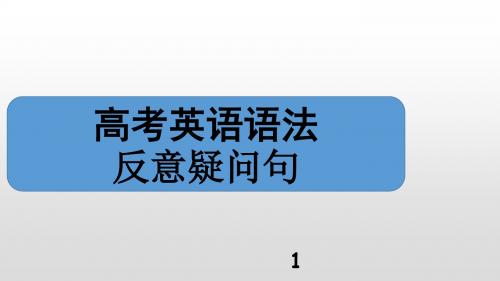
9
当陈述句部分含有主从复合句时,附加部分的代词和助动词 须与主句中的主谓保持一致。
You needn't do it since he has finished it, need you? It's the second time that you have sung that song, isn't it?
ome, shall we?
Let us go home, will you?
Open the door, will you?
5
need和dare既可以用作情态动词,又可以用作行为动词,所以在反意疑 问句中要准确判断其是情态动词还是行为动词。
He needn’t do it again, need he? He doesn’t need to do it again, does he? She dare say it, daren’t she? She doesn’t dare to say it, does she?
2
构成
The car is your father's, The girl doesn't sleep, The doctor can help you,
陈述句
isn't it? does she? can't he?
反意疑问句
be动词/情态动词/助动词 (not)+主语(代词)
3
前肯后否 前否后肯
He thinks that it will rain tomorrow, doesn't he? I think that it will rain tomorrow, won't it? They don't suppose that the film is moving, do they?
当陈述句部分含有主从复合句时,附加部分的代词和助动词 须与主句中的主谓保持一致。
You needn't do it since he has finished it, need you? It's the second time that you have sung that song, isn't it?
ome, shall we?
Let us go home, will you?
Open the door, will you?
5
need和dare既可以用作情态动词,又可以用作行为动词,所以在反意疑 问句中要准确判断其是情态动词还是行为动词。
He needn’t do it again, need he? He doesn’t need to do it again, does he? She dare say it, daren’t she? She doesn’t dare to say it, does she?
2
构成
The car is your father's, The girl doesn't sleep, The doctor can help you,
陈述句
isn't it? does she? can't he?
反意疑问句
be动词/情态动词/助动词 (not)+主语(代词)
3
前肯后否 前否后肯
He thinks that it will rain tomorrow, doesn't he? I think that it will rain tomorrow, won't it? They don't suppose that the film is moving, do they?
反意疑问句ppt课件

• Jack wasn’t playing soccer, _w__a_s _h_e___? • Their parents have gone to London,
__h_a_v_e_n_’_t t_h_e_y__? • I have never been to the park, __h_a_v_e_n’_t_I__? • You have a good friend, __d_o_n_’t_y_o_u___? • We had a meeting, __d_i_d_n_’t_w_e___?
Grammar: 反意疑问句
一、定义:
当我们陈述了一个事实,而又不是很 有把握,就可以在陈述句后加一个简 短问句,称为反意疑问句。它表示提 问人的看法,没有把握,需要对方证 实。反义疑问句由两部分组成:前一 部分是一个陈述句,后一部分是一个 简短的疑问句,两部分的人称时态应 保持一致。
二、结构:
结构一: 前肯,+ 后否 eg. She is a student, isn’t she?
结构二: 前否,+ 后肯 eg. She isn’t a student, is she?
三、反意疑问句的解答步骤
1. 判定(判断该用肯定还是否定); 2. 找动(找句子的助动词:be用be,动词原形do, 三单does,过去did,完成have); 3. 换代(将主语换为人称代词);
2. 一般动词(play, study, watch 等)句型:
现在 主语+play/plays…, don’t (doesn’t) + 主语? 过去 主语+played…, didn’t + 主语?
1 Your mother likes cooking ,_d__o_e_s_n_’t_s_h_e___? 2 He has an apple, __d_o_e_s_n_’_t _h_e____? 3 The plane took off an hour ago, __d_i_d_n_’t_i_t___? 4 He didn’t go to school late this morning,
反义疑问句讲解ppt课件

1 Don’t be late, w_i_ll__y_ou______? 2 Have a rest, ___w_i_ll _y_o_u___? 3 Speak louder, ___w_il_l _yo_u____? 4 Don’t wait for me, _w_il_l _y_ou____?
let
当为〞let us〞时 当为〞let’s〞时
疑问句为“will you〞 前五后四 疑问句为“shall we “ 前四后五
1.Let’s go to park, Shall we ?
前四
后五
2.Let us do homework. Will you ?
前五
后四
回答
不论一定否认,只抓信息点,能否吻合。照实回答
情态动词
像can/will等情态动词,变为否以为can’t/won’t即可
当have 在完成时中或“You had better〞中时,也当情态动词变。 Have/haven’t,had/hadn’t
1.Lily can play football , Can’t she ? 2.Tom will visit China next mouth , Won’t he ? 3.She has been to HongKong , hasn’t she ? 4.You ‘d better lie down and have a rest ,Hadn’t you ? 5.You can’t go out , Can you ?
反义疑问句
Grammar: 反意疑问句
一、定义:
当我们陈说了一个现实,而又不是很 有把握,就可以在陈说句后加一个简 短问句,称为反意疑问句。
例: 1. She is a student, isn’t she? 2. We speak Chinese, don’t we?
let
当为〞let us〞时 当为〞let’s〞时
疑问句为“will you〞 前五后四 疑问句为“shall we “ 前四后五
1.Let’s go to park, Shall we ?
前四
后五
2.Let us do homework. Will you ?
前五
后四
回答
不论一定否认,只抓信息点,能否吻合。照实回答
情态动词
像can/will等情态动词,变为否以为can’t/won’t即可
当have 在完成时中或“You had better〞中时,也当情态动词变。 Have/haven’t,had/hadn’t
1.Lily can play football , Can’t she ? 2.Tom will visit China next mouth , Won’t he ? 3.She has been to HongKong , hasn’t she ? 4.You ‘d better lie down and have a rest ,Hadn’t you ? 5.You can’t go out , Can you ?
反义疑问句
Grammar: 反意疑问句
一、定义:
当我们陈说了一个现实,而又不是很 有把握,就可以在陈说句后加一个简 短问句,称为反意疑问句。
例: 1. She is a student, isn’t she? 2. We speak Chinese, don’t we?
反义疑问句最全PPT课件

3.陈述部分由neither… nor, either… or 连接的并列主语 时,疑问部分根据其实际逻辑意义而定。
Neither you nor I am engineer, are we?
4.陈述部分主语是指示代词或不定代词everything, that, nothing, this, 疑问部分主语用it。
(二)陈述部分有表示过去的时间状语,疑问部分的动词 就用一般过去时。(didn’t + 主语) She must have read the novel last week, didn’t she?
b 表示否定推测时,否定式通常不是must not,而是 can’t (cannot) He can’t have been to your home because he doesn't know your address, does he?
6.否定前缀不能视为否定词,其反意疑问句仍用否定形式。 It is impossible, isn’t it? He is not unkind to his classmates, is he?
7.当主句是由so引起的一个句子,而且译为“这么说来” 时,疑问部分的谓语形式(肯定或否定)应与主句保持一 致。 So you have seen the film, have you? So he has not been to Beijing, has he?
b. 带有定语从句,宾语从句的主从复合句,疑问部分谓 语根据主句的谓语而定 He is not the man who gave us a talk, is he? He said he wanted to visit Japan, didn’t he?
c. 上述部分主句是由谓语think, believe, expect, suppose, imagine等引导的宾语从句,疑问部分与宾语 从句相对应构成反意疑问句 I don't think he is bright, is he? We believe she can do it better, can't she?
中考英语复习课件PPT:反义疑问句详细课件(PPT27张)
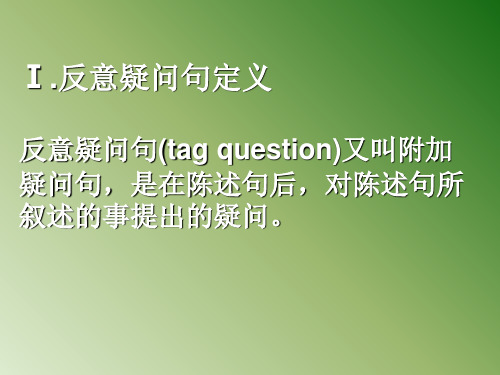
[正] Tom can speak Chinese well, can’t he﹖
一般现在时: Lily likes going shopping, doesn’t _______she? are They aren’t students, _______ they? 现在进行时: You’re going to the cinema, _______ aren’t you? is She isn’t waiting for me, _______ she?
2.当陈述部分的主语是everybody, everyone, someone, no one, nobody, somebody等指人的不定代词时,反意 疑问句的附加部分的主语通常用they,但 也可用he。例如: 1)Everybody is here, isn’t he? 2)Nobody wants to go there, don’t they?
5.陈述部分带有 never, few, little, hardly,seldom,nobody,none,no, too…to, nothing等否定意义的词时, 反意疑问句的附加部分的动词用肯 定形式。 例如: Few people know him, do they? She never goes swimming, does she?
Nothing could stop them, could it?
Everything is ready, isn’t it?
6 当陈述部分动词为have(has)时,有以下几种 情况: 1)Have在一般现在时中表示“有”之意,附加 问句的谓语可用have也可用助动词do.
Hale Waihona Puke Eg Tom has a new watch ,hasn’t /doesn’t he?
反义疑问句详细讲解课件(PPT27张)
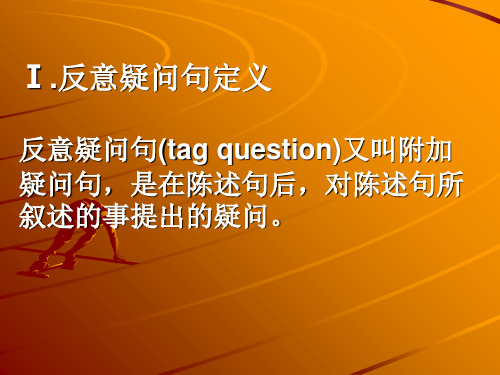
I don’t believe he has finished his work.
7.当陈述部分的主句是I think (expect, believe)等结构时,反 意疑问句的附加部分则往往与从 句中的主语和谓语动词保持对应 关系,但要注意否定的转移。 例如:
I think he’s funny, isn’t he? I don’t believe she likes my
You must have seen the film last week, didn’t you?
6. 当陈述部分是I am…时,反意疑 问句部分通常要用aren’t I;如陈述 句部分的主语是I am not时,反意疑 问句部分通常要用am I。 例如:
1)I am a teacher, aren’t I?
Ⅰ.反意疑问句定义
反意疑问句(tag question)又叫附加 疑问句,是在陈述句后,对陈述句所 叙述的事提出的疑问。
Ⅱ.基本结构:
陈述句+逗号+简短的一般疑问句?
遵循前肯定后否定前否后肯式的原则
①前肯后否式。例如:
You are all students, aren’t you﹖
②前否后肯式。例如:
Let’s have a rest, shall we? 以let us开头的祈使句,不包括 说话人在内,因此反意疑问句的 附加部分用will you。例如:
Let us stop now, will you?
Ⅳ. 反意疑问句的回答 “ 根据事实回答”
对反意疑问句的回答,无论问题的提法如何,如果 事实是肯定的,就用yes,事实是否定的,就要用no。 要特别注意陈述句部分是否定结构,反意疑问句部分 用肯定式提问时,回答yes或no与汉语正好相反。这 种省略回答的yes要译成“不”,no要译成“是”。
7.当陈述部分的主句是I think (expect, believe)等结构时,反 意疑问句的附加部分则往往与从 句中的主语和谓语动词保持对应 关系,但要注意否定的转移。 例如:
I think he’s funny, isn’t he? I don’t believe she likes my
You must have seen the film last week, didn’t you?
6. 当陈述部分是I am…时,反意疑 问句部分通常要用aren’t I;如陈述 句部分的主语是I am not时,反意疑 问句部分通常要用am I。 例如:
1)I am a teacher, aren’t I?
Ⅰ.反意疑问句定义
反意疑问句(tag question)又叫附加 疑问句,是在陈述句后,对陈述句所 叙述的事提出的疑问。
Ⅱ.基本结构:
陈述句+逗号+简短的一般疑问句?
遵循前肯定后否定前否后肯式的原则
①前肯后否式。例如:
You are all students, aren’t you﹖
②前否后肯式。例如:
Let’s have a rest, shall we? 以let us开头的祈使句,不包括 说话人在内,因此反意疑问句的 附加部分用will you。例如:
Let us stop now, will you?
Ⅳ. 反意疑问句的回答 “ 根据事实回答”
对反意疑问句的回答,无论问题的提法如何,如果 事实是肯定的,就用yes,事实是否定的,就要用no。 要特别注意陈述句部分是否定结构,反意疑问句部分 用肯定式提问时,回答yes或no与汉语正好相反。这 种省略回答的yes要译成“不”,no要译成“是”。
反义疑问句(共14张PPT)全

二、前否+后肯
1.She wasn’t ill last week, was she ? 2.It doesn’t often rain here, does it? 3.Tom won’t go to Shanghai next year,
will he ?
特殊用法1—祈使句的反义疑问句
1、肯定祈使句的反意疑问句,疑问部分用will you或won’t you,否定祈使句则用will you ? 如: Don't do that again, will you? Go with me, will you / won't you?
13、He who seize the right moment, is the right man.谁把握机遇,谁就心想事成。2024/10/172024/10/172024/10/172024/10/1710/17/2024 +14、谁要是自己还没有发展培养和教育好,他就不能发展培养和教育别人。2024年10月17日星期四2024/10/172024/10/172024/10/17 +15、一年之计,莫如树谷;十年之计,莫如树木;终身之计,莫如树人。2024年10月2024/10/172024/10/172024/10/1710/17/2024 +16、教学的目的是培养学生自己学习,自己研究,用自己的头脑来想,用自己的眼睛看,用自己的手来做这种精神。2024/10/172024/10/17October 17, 2024 +17、儿童是中心,教育的措施便围绕他们而组织起来。2024/10/172024/10/172024/10/172024/10/17
一 、前肯+后否 含be动词
1.He is a doctor, isn’t he? 2.I am Chinese, aren’t I?
反义疑问句PPT课件
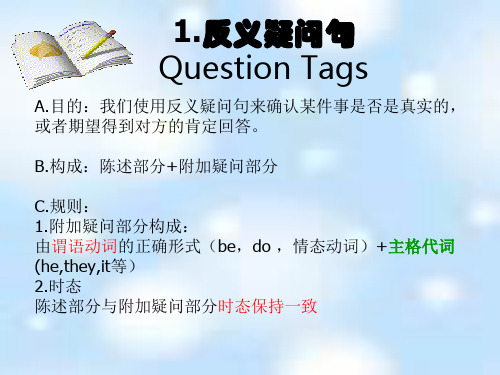
陈述部分
疑问部分
mustn't表示“禁止,不可, 不必”时
must
例句
You mustn't stop your car here,must you?
must表示“有必要”时
needn't
They must finish the work today,needn't they?
当must用来表示对现在的 情况进行推测时
She must have read the novel last week,didn't she?
Your daughter must have 要用“haven't/hasn't+主语”。 been to Africa, hasn't
she ?
You must be tired , _ar_e_n’_t _yo_u___ ?
2) 祈使句式反意疑问句
Let’s go home,_s_h_a_ll_w_e_? Let us go,__w__il_l _yo_u__? Let me go,_w__il_l _y_ou__? Come here please, __w_i_ll_y_o_u__? Never ask her again,_w__il_l /_c_a_n__y_ou__?
语
there, didn't he? / usedn't he?
had better(最好) + v.
hadn't you?
would rather(宁可、宁愿) +v.
wouldn't +主语
You'd like to +v.
反义疑问句详细讲解课件(PPT27张)

2) have to表示“不得不,必须”之意 时,附加问句的谓语应用助动词do.
Kate has to help her mother at home,doesn’t she?
3) have表示“吃,喝,玩,度过”等意 思时,其附加问句的谓语应用助动词do.
They had a good time in Beijing ,didn’t they?
Ⅰ.反意疑问句定义
反意疑问句(tag question)又叫附加 疑问句,是在陈述句后,对陈述句所 叙述的事提出的疑问。
Ⅱ.基本结构:
陈述句+逗号+简短的一般疑问句?
遵循前肯定后否定前否后肯式的原则
①前肯后否式。例如:
You are all students, aren’t you﹖
②前否后肯式。例如:
[误] Tom can speak Chinese well, can’t Tom﹖
[正] Tom can speak Chinese well, can’t he﹖
一般现在时:
Lily likes going shopping, d_o_e_s_n__’t_she? They aren’t students, __a_r_e___
You must have seen the film last week, didn’t you?
6. 当陈述部分是I am…时,反意疑 问句部分通常要用aren’t I;如陈述 句部分的主语是I am not时,反意疑 问句部分通常要用am I。 例如:
1)I am a teacher, aren’t I?
The End
They must come on time,needn’t they?
2)must表示推测,“一定,想必”之意,附加问 句的谓语动词的确定应根据must后面的动词。
Kate has to help her mother at home,doesn’t she?
3) have表示“吃,喝,玩,度过”等意 思时,其附加问句的谓语应用助动词do.
They had a good time in Beijing ,didn’t they?
Ⅰ.反意疑问句定义
反意疑问句(tag question)又叫附加 疑问句,是在陈述句后,对陈述句所 叙述的事提出的疑问。
Ⅱ.基本结构:
陈述句+逗号+简短的一般疑问句?
遵循前肯定后否定前否后肯式的原则
①前肯后否式。例如:
You are all students, aren’t you﹖
②前否后肯式。例如:
[误] Tom can speak Chinese well, can’t Tom﹖
[正] Tom can speak Chinese well, can’t he﹖
一般现在时:
Lily likes going shopping, d_o_e_s_n__’t_she? They aren’t students, __a_r_e___
You must have seen the film last week, didn’t you?
6. 当陈述部分是I am…时,反意疑 问句部分通常要用aren’t I;如陈述 句部分的主语是I am not时,反意疑 问句部分通常要用am I。 例如:
1)I am a teacher, aren’t I?
The End
They must come on time,needn’t they?
2)must表示推测,“一定,想必”之意,附加问 句的谓语动词的确定应根据must后面的动词。
反义疑问句的用法归纳 课件 共27张PPT

1. 基本原则:若陈述部分为祈使句,疑问部分通常用will you:
Please help us, will you? 请帮帮我们,好吗?
Come with us, will you? 同我们一起去,好吗?
Don’t forget to post the letter, will you? 请别忘了寄信。
五、陈述部分为祈使句的反意疑问句
3. 当祈使句为Let us时,若表示请求,疑问部分用will you,若表示建 议,疑问部分用 shall we:
Let us know your address, will you? 好吗?
请把你的地址告诉我们,
Let us go swimming together, shall we? 吗?
我们一起去游泳好
反义疑问句的用法归纳 课件 共27张PPT
反义疑问句的用法归纳 课件 共27张PPT
六、陈述部分为主从复合句的反意疑问句
• 1. 当陈述部分为主从复合句【主句+从句】时,疑问部分一般应与主句保 持一致:
He said that he didn’t like it, didn’t he? 它,是不是?
你不准笑,知道吗?
② 若must表示推测,疑问部分不能用must,而应根据must后的动词结 构采用相应的动词形式:
He must be tired, isn’t he?
他一定累了,是吗?
反义疑问句的用法归纳 课件 共27张PPT
反义疑问句的用法归纳 课件 共27张PPT
五、陈述部分为祈使句的反意疑问句
We need not do it again, need we ? He dare not say so, dare you? 【注】当dare, need 为实义动词时,疑问部分用助动词do + 主语。 She doesn't dare to go home alone, does she?
Please help us, will you? 请帮帮我们,好吗?
Come with us, will you? 同我们一起去,好吗?
Don’t forget to post the letter, will you? 请别忘了寄信。
五、陈述部分为祈使句的反意疑问句
3. 当祈使句为Let us时,若表示请求,疑问部分用will you,若表示建 议,疑问部分用 shall we:
Let us know your address, will you? 好吗?
请把你的地址告诉我们,
Let us go swimming together, shall we? 吗?
我们一起去游泳好
反义疑问句的用法归纳 课件 共27张PPT
反义疑问句的用法归纳 课件 共27张PPT
六、陈述部分为主从复合句的反意疑问句
• 1. 当陈述部分为主从复合句【主句+从句】时,疑问部分一般应与主句保 持一致:
He said that he didn’t like it, didn’t he? 它,是不是?
你不准笑,知道吗?
② 若must表示推测,疑问部分不能用must,而应根据must后的动词结 构采用相应的动词形式:
He must be tired, isn’t he?
他一定累了,是吗?
反义疑问句的用法归纳 课件 共27张PPT
反义疑问句的用法归纳 课件 共27张PPT
五、陈述部分为祈使句的反意疑问句
We need not do it again, need we ? He dare not say so, dare you? 【注】当dare, need 为实义动词时,疑问部分用助动词do + 主语。 She doesn't dare to go home alone, does she?
反义疑问句讲解PPT课件

•
642 Guang Zhong Road
•
Shanghai, 200080
•
P. R. CHINA
Main ideas
• Joe Lampson’s decision surprised his father(1-2)
• Joe Lampson’s program improved the trading situation in business.(3)
didn’t he? • 但陈述部分为I
think/believe/suppose/figure/imagine/feel等+宾 语从句时,疑问部分应同宾语从句保持一致 • I don’t think he can finish his work in time, can he?我觉得他不能及时完成工作,他能吗?
1 There is a pen on the chair, Isn’t there ? 2 There are 60 students in our class, Aren’t 3. There will be a paper factory near mthyere? home in about 2 years, Won’t there ?
7. 祈使句的反意疑问句
祈使句, will you ?
1 Don’t be late, w_i_ll__y_ou______? 2 Have a rest, ___w_i_ll _y_o_u___? 3 Speak louder, __w__il_l _yo_u____? 4 Don’t wait for me, _w_il_l _y_ou____? 祈使句无论是肯定的还是否定的,疑问部分 一般用will you?
最新中考复习--反义疑问句(共30张PPT)教育课件

二、各类动词的反义疑 问句
A. 含be(is, are, was, were)
1.---You are from America, aren’t you? ---Yes, I am. /No, I’m not.
2. ---The Green weren’t at home last night, were they?
弄
五
分
钟
就
弄
完
所
以
最
后
通
常
变
成
我
自
己
弄
。
但
这
样
做
有
一
个
不
好
的
后
果
就
是
当
你
真
–
■
电
:
“
色
情
男
女
是
你
和
尔
东
口
罗
其
实
不
是
•
■电 你是 否有 这样 经历 ,当 你 在做 某一 项工 作和 学习 的 时候 ,脑 子里 经常 会蹦 出各 种 不同 的需 求。 比如 你想 安 心 下来 看2 小时 的书 ,大 脑会 蹦出 口渴 想 喝水 ,然 后喝 水的 时候 自 然的 打开 电视 。。 。。 。。 , 一个 小时 过去 了, 可 能书 还没 看2 页。 很多 时候 甚至 你自 己 都没 有意 思到 ,你 的大 脑 不停 地超 控你 的注 意力 ,你 就 这么 轻易 的被 你的 大 脑所 左右 。你 已经 不知 不觉 地 变成 了大 脑的 奴隶 。尽 管 你在 用它 思考 ,但 是你 要明 白你 不应 该隶 属于 你的 大脑 , 而应该 是你 拥有 你的 大脑 ,并 且应 该是 你可 以控 制你 的大 脑才 对。 一切 从你 意识 到你 可以 控制 你的 大脑 的时 候, 会改变 你的 很多 东西 。比 如控 制你 的情 绪, 无论 殊词类做主语的反意疑问句
A. 含be(is, are, was, were)
1.---You are from America, aren’t you? ---Yes, I am. /No, I’m not.
2. ---The Green weren’t at home last night, were they?
弄
五
分
钟
就
弄
完
所
以
最
后
通
常
变
成
我
自
己
弄
。
但
这
样
做
有
一
个
不
好
的
后
果
就
是
当
你
真
–
■
电
:
“
色
情
男
女
是
你
和
尔
东
口
罗
其
实
不
是
•
■电 你是 否有 这样 经历 ,当 你 在做 某一 项工 作和 学习 的 时候 ,脑 子里 经常 会蹦 出各 种 不同 的需 求。 比如 你想 安 心 下来 看2 小时 的书 ,大 脑会 蹦出 口渴 想 喝水 ,然 后喝 水的 时候 自 然的 打开 电视 。。 。。 。。 , 一个 小时 过去 了, 可 能书 还没 看2 页。 很多 时候 甚至 你自 己 都没 有意 思到 ,你 的大 脑 不停 地超 控你 的注 意力 ,你 就 这么 轻易 的被 你的 大 脑所 左右 。你 已经 不知 不觉 地 变成 了大 脑的 奴隶 。尽 管 你在 用它 思考 ,但 是你 要明 白你 不应 该隶 属于 你的 大脑 , 而应该 是你 拥有 你的 大脑 ,并 且应 该是 你可 以控 制你 的大 脑才 对。 一切 从你 意识 到你 可以 控制 你的 大脑 的时 候, 会改变 你的 很多 东西 。比 如控 制你 的情 绪, 无论 殊词类做主语的反意疑问句
反义疑问句精品课件

B. needn’t
C. aren’t
D. can’t
8. He dislikes the two subjects, __ ___ he?
A. does
B. doesn’t
C. is
D. isn’t
exercise
9. These tools are useless now, __ ___ ?
A. are they B. aren’t they
你应该通过考试了,是吗? You ought to pass the Examination,
_o_u_g__h_t_n_’t__/_s_h_o__u_ld__n_’t__you?
(3)陈述句部分的谓语含有used to,用use(d)n’t/didn’t; 陈述句部分的谓语含有ought to,用oughtn’t/shouldn’t
我想要一个长假,可以吗?
I wish to have a short vocation,_m__a_y_I___?
我想去美国旅行,行吗?
I wish to visit America,_m__a_y__I_?
(4)陈述部分的谓语是wish,疑问部分要用may +主语。
exercise
1. He can’t be her father, _____ he?
A. hadn’t
B. wouldn’t
C. didn’t
D. mustn’t
6. You dare not do that, __ __ you?
A. don’t
B. do
C. dare
D. daren’t
exercise
7. You must be tired, ___ __ you?
反义疑问句完整ppt课件
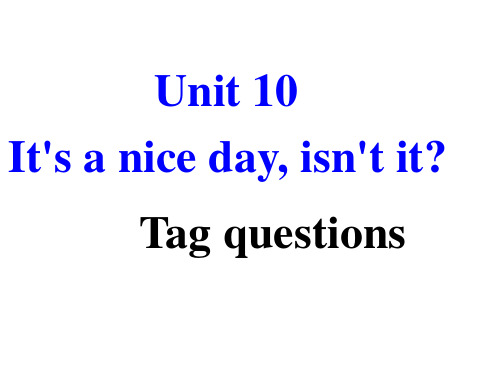
Jay sings many songs, doesn’t he ? Yes, he does.
Lily was ill in bed, _w_a_s_n_’t_s_he__?
Yes, she was.
The students were in the classroom,w_e_re_n_’t_t_he_y_?
___d_o_e_s__ _s_h_e__ ? 6. You didn’t call me yesterday,
__d_i_d___ _y_o_u__?
7. You won’t go to the U.S.A., _w_i_ll___you
____?
8. There isn’t a boy in our classroom,
1. 前肯,+ 后否
be 动词:
1. You are an actor, __a_r_e_n__’t_ __y_o_u_ ? 2. He is a good boy, ___i_s_n_’t__ ___h_e__ ? 3. It was fine yesterday, _w_a__s_n_’t_ _i_t_ ? 4. You were studying when I called
其它动词:
1. You will go to America, _w_o__n_’t_ _y_o_u? 2. We have ever been to Shanghai,
__h_a_v_e_n__’t_ __w_e___ ?
2. 前否,+ 后肯
1. You aren’t an actor, ___a_r_e_ _y_o_u_ ? 2. He isn’t a good boy, ____i_s_ _h__e__ ? 3. It wasn’t fine yesterday, _w_a__s __i_t_ ? 4. It doesn’t rain here, __d_o_e_s_ __i_t_ ? 5. His sister doesn’t have a headache,
反义疑问句PPT

复合句主句为I/ we think/ believe/ suppose/ hope/ be sure时,反义疑问句的 主语谓语与宾语从 come by train, _________ usedn’t/didn’t she ? 陈述部分有used to,疑问部分可用 usedn’t,或didn’t。
Grammar
反义疑问句
Pip loves Estella, doesn’t he ? Yes, he does. Does Estella love Pip?
主句谓语 助动词\be动词\情态动词+主语
doesn’t she ? She likes the idea,_______ Tractors are working in the fields, aren’t they ? ________ He mustn’t park the car here, must he _______?
there be引导的反义 疑问句其附加疑问句 为:be/ not be+ there?
Pip told him his home was not the same with others’, didn’t he ?
复合句,反义疑问句 的主语谓语与主句的 主语谓语一致。
I didn’t think my home was the same with others’, was it ?
medical; research; knowledgeable; downstairs; burn; refuse; helpful; possibly; owner; neighbor; director; finger; photograph; energy; honest; course; expect; laboratory; cancer; consider; sight; underground; translate; provide; programming
相关主题
- 1、下载文档前请自行甄别文档内容的完整性,平台不提供额外的编辑、内容补充、找答案等附加服务。
- 2、"仅部分预览"的文档,不可在线预览部分如存在完整性等问题,可反馈申请退款(可完整预览的文档不适用该条件!)。
- 3、如文档侵犯您的权益,请联系客服反馈,我们会尽快为您处理(人工客服工作时间:9:00-18:30)。
10
They aren’t playing pingpong, are they ?
Yes, they .are.
11
The girl is crying, isn’t she? Yes , she is .
The girl isn’t crying, is she ?
Yes , she is.
.
18
No.2 1.She has no money with her,does she ?
2.There is nothing in the bag, is there ?
3.There is nobody in the room, is there ?
4.Tom has never came to China , has he ?
9)They have been to Beijing by
bus, haven’t they ?
10)Danny hasn’t written the
e-mail , has he ?
.
14
Special tag questions
特殊结构的反义疑问句
.
15
(1)含有 There be 结构的反义疑问句
达习惯,就答:“No, he isn’t”. • 而不能说“Yes,he isn’t.”。
.4Βιβλιοθήκη 1.It is a funny animal, isn,t it?
2.They are nice pictures , aren,t they?
3.You live in a small town ,don,t you ?
are there ?
.
17
(2)陈述句部分出现no, nobody, never, none,neither等 表示否定意义的词时,反意疑问部 分应用肯定形式。如: There is no rice in the bowl, is there?碗 里几乎没有米饭,是吗?
You can understand nothing, can you? 你几乎不能理解这一点,是吗?
•
2.助动词和人称前后一致
• You are from Australia,aren’t you?
• He doesn’t live in Beijing,does he?
summery
• 反意疑问句的回答方法 • 反意疑问句都要用yes或no来回答, • 只要事实是肯定的,就用yes,反之则用no。 • 如: He isn’t a student,is he? • 如果这个“he”的确不是学生,按照英语表
.
20
No.3
1.I have few friends here, do I ?
2.I have a few friends here, don’t I ?
3.She has little money in her bag, does she ? 4.She has a little money in her bag, doesn’tshe ?
There aren’t any books in his bag, are there?
.
16
NO.1 1.There is a singer in the room, isn’t there? 2.There is some milk in the bottle,isn’t there ? 3.There are some birds in the sky, aren’t there? 4.There isn’t sugar in the glass, is there ? 5.There aren’t any apples in the basket,
4. Liming makes lots of friends, doesn’t he ?
.
8
5.Beckham can’t play football , can he?
Yes , he can.
They ’re playing pingpong, aren’t they?
Yes, they are. .
The girl isn’t laughing, is she ?
No. ,she isn’t
12
Exercises 1)She is here , isn’t she?
2)This is my apple, isn’t it ? 3)Your books lost, didn’t they?
4)They do not go to school by bus, do they ?
5.None of the boys can sing this song,
can they ?
.
19
(3)陈述句部分出现 few,little, hardly(几乎不)等,虽不是否定词,但 表示否定意义的词时,反意疑问部 分应用肯定形式。如: There is little rice in the bowl,is there? 碗里几乎没有米饭,是吗? You can hardly understand it,can you? 你几乎不能理解这一点,是吗?
Dingningdian Middle School
.
1
Tag questions
反义疑问句
.
2
summary
1.结构:
陈述句+简短反义疑问句(助动词\be动词\情态动 词+陈述部分主语的相应代词)
2.规律
前肯定,后否定 ; 前否定,后肯定
(即前肯后否,前否后肯 ; 又或+,-;-,+)
• 注意:1.前肯后否或前否后肯
5)Danny and Jenny will come to China , won’t they?
.
13
Exercises
6) He isn’t piaying football now , is he ? 7)She has nothing to tell you,
doesn’t she ?
8)They are playing with many birds here , aren’t they ?
进行简短反问时,要用there进行反问。 Eg.
There is a cat in the tree, isn’t there?
There are some boys in the room, aren’t there?
There isn’t water in the glass, is there?
